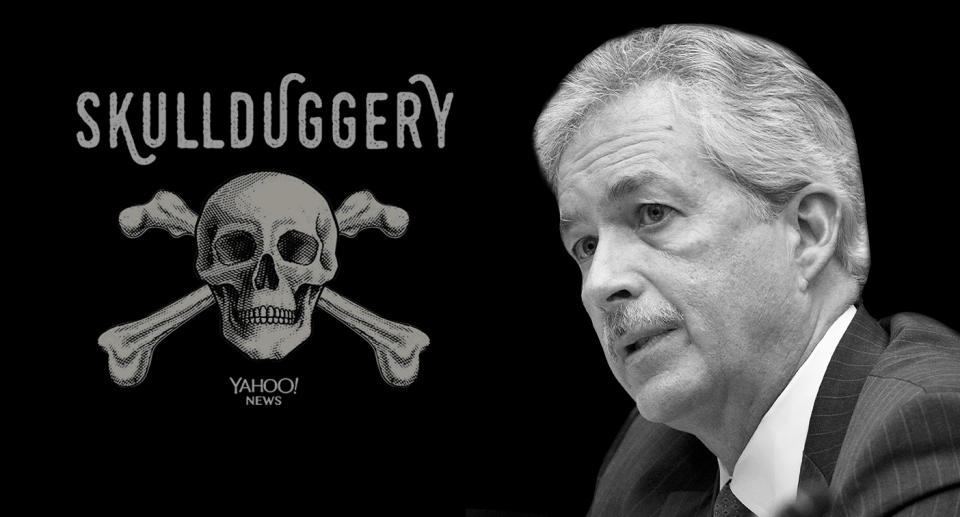Former top U.S. diplomat deplores policy toward Iran 'untethered to any coherent strategy'
President Trump seriously miscalculated when he scrapped the U.S.-Iran nuclear deal, embarking on a policy “untethered to any coherent strategy,” according to a scathing assessment by William Burns, the former U.S. diplomat who negotiated the nuclear agreement. Burns said the move was certain to embolden hard-liners in Tehran and contribute to military tensions in a way that will backfire against the U.S. — which was already happening this week, as news broke that Iran had shot down an American military drone.
“We’re worse off today as a result of bailing out” of the nuclear deal, Burns, former deputy secretary of state under President Obama and now president of the Carnegie Endowment for International Peace, said in an interview for the Yahoo News podcast “Skullduggery.”
“And if our goal is regime change, we’re worse off today too because in a sense we’re playing the game of hard-liners in the regime in Tehran, whose grip on power is probably even stronger.”
The remarks came shortly after the announcement that the Iranian military had shot down a U.S. drone, but before Trump canceled a retaliatory strike at the last minute, with U.S. forces “cocked & loaded.” But Burns made clear he sees the escalation in military tensions between the two countries as an inevitable consequence of the decision to pull out of the agreement, which he had hammered out in secret, back-channel negotiations with the Tehran regime.
“The Iranian attack on the drone, just like the attacks on tankers a few days ago are reckless and dangerous steps, but they come against a backdrop” of Trump’s move to scrap the nuclear deal, Burns said.
“What’s deeply unfortunate is here you have a president who’s ripped up American compliance with that agreement, unburdened by any sense of the facts in the agreement or anything else.”
The critique by Burns, a 33-year veteran of the foreign service and former ambassador to Jordan and Russia, is not surprising. As he relates in his new book, “The Back Channel: A Memoir of American Diplomacy and the Case for Its Renewal,” he spent nearly two years on a top-secret mission to head off Tehran’s nuclear-weapons project, flying in unmarked airplanes and ducking into hotel service elevators to negotiate with Iranian officials who were deeply suspicious of U.S. intentions.
He acknowledges that the deal he worked out was not perfect. “We could have done a better job, both before and after the comprehensive nuclear agreement was reached, of confronting the wider challenge of Iran in the Middle East.”
But Burns said the agreement did defuse the “imminent risk” of Iran developing a nuclear bomb — something achieved only because the U.S. worked with European allies to impose international sanctions, resulting in a precipitous drop in the nation’s oil exports and the value of its currency.
Trump abandoned the deal unilaterally, depriving the United States of the international leverage it had mustered and making the Iranians even less willing to agree to U.S. demands, he says.
“I mean there, it’s not a very sentimental leadership,” he said, referring to the supreme leader, Ayatollah Ali Khamenei, and “the guys around him.” “You know, they’re deeply suspicious of engaging with the United States, and they’re deeply disinclined to negotiate under what they see to be pressure.”

Download or subscribe on iTunes: “Skullduggery” from Yahoo News
The nuclear deal “didn’t solve the problem of Iran,” he said. “Iran still posed lots of threats to the United States.” But from the outset, Obama’s intention was to build on the agreement and modify Iranian behavior over time, a goal increasingly out of reach.
Instead, Burns observed, the Trump administration now seems to be at war with itself.
“That’s the incoherent part,” he said. “You know, what [national security adviser] John Bolton has stood for for many years, what I think Secretary [of State Mike] Pompeo clearly supports, is a set of aims that’s aimed more at either the capitulation of the Iranian regime or its implosion. I don't think either of those are realistic goals for policy. So what happens when you’re standing on that incoherent strategic terrain is your allies start to lose faith. … And your adversaries, in this case Iran, are prone to miscalculation because they’re going to assume the worst about our policy, that it’s aimed at regime change.”
For all his criticism of Trump, Burns in his book and in the interview is painfully honest about mistakes he and others in the Obama administration made, especially in the failure to more forcefully confront the Iranian- and Russian-backed regime of President Bashar Assad in Syria. “A willingness to take more risks against the Assad regime after the Syrian civil war began in 2011 would have sent a strong signal to Iran, and cushioned the disquieting effect of the nuclear deal for the Saudis and other traditional friends,” Burns wrote in his book. Elsewhere, in the book, he wrote: “It is hard not to see Syria’s agony as an American policy failure.”
In particular, Burns cited Obama’s failure in 2013 to enforce his “red line” on Syrian use of chemical weapons with a military strike. Obama had once famously said he was “very proud” of his decision.
Burns clearly views it otherwise. “You look at the famous red-line incident with Syria when Assad had killed 1,400 Syrian civilians with the use of chemical weapons,” he said. “I thought at the time that was a moment when had we responded with a punitive military strike, it wouldn’t have changed the equation on the ground in Syria ... but I think it would have sent a signal, not just to the Iranians, but to the Israelis and to the Gulf Arabs that there were circumstances under which we’d use force.”
_____
Read more from Yahoo News:



